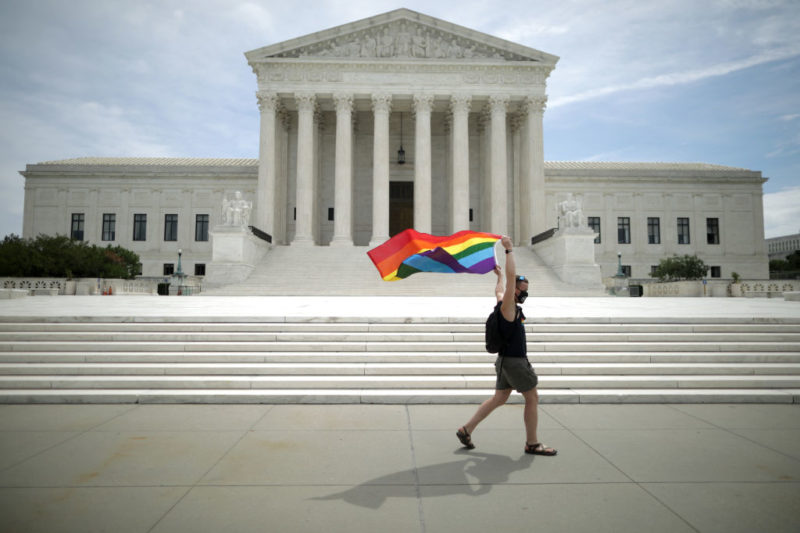How Did a Trump-Appointed Justice End Up Protecting LGBTQ Rights?
The Supreme Court handed LGBTQ employees a historic win Monday. And they have conservative Justice Neil Gorsuch to thank.

For our full coverage of June Medical Services v. Russo, check out our Special Report.
Well, I for one did not see that coming.
The U.S. Supreme Court ruled Monday that federal employment discrimination law protects LGBTQ employees. Frankly, I thought this case was going to turn out the other way.
Instead of a 6-3 majority opinion that included Chief Justice John Roberts and was written by Justice Neil Gorsuch, a Trump appointee, confirming that firing someone because of their sexual orientation or gender identity is by its very nature sex discrimination, I braced for a 5-4 decision and an opinion authored by Roberts explaining that, “Gee whiz, the Court would really love to protect LGBTQ workers from employment discrimination but that’s the job of Congress, not the courts.”
I assumed Justice Samuel Alito would pen a concurring opinion gleefully declaring that not only are LGBTQ employees not covered by federal anti-discrimination law, but also employers actually have an affirmative duty to eradicate all signs of queerness from the workplace, lest those employers discriminate against white evangelicals.
Let me tell you, I’m so happy to have been wrong.
Monday’s decision is nothing short of historic. It is a clear-eyed affirmation of LGBTQ employees’ workplace rights. It sets out very plainly that pegging employment decisions to who they are is not OK under federal law. This should be of immediate relief for the LGBTQ employees in about half the country who don’t have protection from employment discrimination.
That is a significant victory that deserves celebration.
So what happened? How is it that a Supreme Court with a conservative majority got this right?
The answer to those questions resides with Roberts, and I don’t think he’s going to spill the beans. But Monday’s opinion offers a couple of clues as to why he sided against LGBTQ workplace discrimination.
First is the fact that Gorsuch wrote it. During oral arguments, Gorsuch appeared the most moveable of the conservatives on the basic question whether the “because of sex” text of Title VII of the 1964 Civil Rights Act covers discrimination because of a person’s sexual identity and/or gender identity. And his opinion Monday makes the clear and direct case that the text of the statute protects LGBTQ employees.
This conclusion puts Gorsuch in line with the liberal block on the Court as to the conclusion—Title VII protects LGBTQ employees—but not necessarily on the path to get there. That’s where Roberts’ joining in begins to matter even more.
By siding with Gorsuch, Roberts made this a 6-3 majority and can rebuff claims of outright politicization of the Court for the moment. He also gets to assign which justice writes the majority opinion. And you know who didn’t write Monday’s opinion? Justice Ruth Bader Ginsburg, who would have likely been the author in a 5-4 decision that included Gorsuch siding with the liberals and Roberts joining his fellow conservatives.
That could end up mattering a whole lot in future LGBTQ rights cases.
But wait, there’s another clue. While Gorsuch’s majority opinion is a tight, buttoned-up textualist defense of Title VII covering LGBTQ employees, it offers up a big juicy meatball to conservatives. Near the end of the opinion, Gorsuch concedes that both the First Amendment and the Religious Freedom Restoration Act (RFRA) may offer some reprieve to employers who wish to discriminate against LGBTQ employees. And as conservative luck would have it, the Roberts Court is currently considering dramatically expanding some of those employer protections. It could be that Monday’s win is soon undercut, by Gorsuch himself, in these future cases.
We’ll worry about that in a few days. Right now, let’s savor this win.
“Sometimes small gestures can have unexpected consequences,” Gorsuch wrote Monday. That opening line may come to define these cases, and the arc of LGBTQ rights.
What difference will it make that Gorsuch wrote Monday’s opinion and not Ginsburg? Will the clear-eyed textual case against gender identity and sexual orientation discrimination in Title VII make its way over to similar opinions involving attempts to strip rights of trans students, or to the Trump administration’s most recent efforts to attack trans patients by attempting to upend legal protections written into the Affordable Care Act? Can the Court’s definition of sex discrimination be scaffolded to protect housing rights and education rights?
These are the fights that remain, and how they’ll shake out isn’t entirely clear yet. But Monday’s decision is an important step in crafting real legal protections for LGBTQ employees and for extending those protections beyond the workplace. And it could be that we have a conservative justice to thank.
2020. What a year.
